Playing the Bench Game: Progressive Groups Take Aim at the Federal Judiciary
Noting the "breakneck" pace that President Donald Trump has been able to add circuit court judges to the bench, progressive groups want the chance to reshape the federal courts in 2020.
November 25, 2019 at 10:00 AM
7 minute read
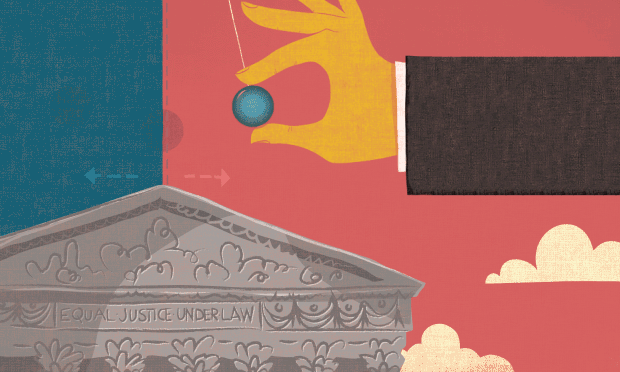
When Democratic Sen. Mazie Hirono addressed the American Constitution Society's convention in June, she painted a dire picture for progressives over President Donald Trump's reshaping of the federal judiciary.
She described the "breakneck" pace that Trump, aided by Senate Majority Leader Mitch McConnell, has been able to add a stunning amount of circuit court judges to the bench and said that they "broke in almost every room norm and tradition to get there."
But, the Democratic member of the Senate Judiciary Committee noted, Republicans didn't get there alone. They had the help of conservative outside groups like the Federalist Society and Heritage Foundation.
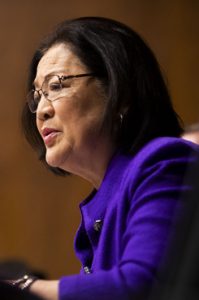 Senator Mazie Hirono, D-Hawaii.
Senator Mazie Hirono, D-Hawaii."Half the battle is showing up. So you folks have shown up," Hirono told the crowd at the left-leaning group's convention. "And showing up means not just physically being here, but to stay the course, because it's going to take us continuing to be on course to turn the tide against the court packing that is going on. And believe me, the Federalist Society has been spending decades and millions of dollars to get their judges to their into their lifetime positions."
"So the integrity and independence of the federal judiciary is at stake," she added.
Just a few months later, the American Constitution Society has a chance to rethink the way it can play a role for judicial nominees for a future Democratic administration, as it searches for a new leader to replace former ACS president Caroline Fredrickson, who stepped down earlier this year.
While the conservative Federalist Society has been a major player in Trump's judicial nominees, liberal groups aren't necessarily looking to follow the same model—have one organization be a key resource for a Democratic White House on the courts.
"We care a lot about ideas," said Pamela Karlan, a professor at Stanford Law School and chair of the ACS board of directors. "And so we want somebody who has, essentially, ideas about how to best incubate and disseminate great ideas from our network, because we think the strength of our group is in the people."
 Pamela Karlan, of Stanford Law School.
Pamela Karlan, of Stanford Law School.The ACS presidential search is still in its early stages. Karlan said the group is keeping the process under wraps, partly out of concerns that naming candidates for the top job could cause people to withdraw from consideration.
The group has tapped the consulting firm Korn Ferry for the search. And a description of the kinds of candidates ACS is searching for offers broad ideas about the organization's priorities down the road.
"ACS' President will engage and strengthen ACS' vibrant network and grow its membership, help to place the next generation of talented and progressive legal professionals in positions of leadership, and grow the state and federal judicial pipelines with nominees from diverse backgrounds who are committed to a progressive understanding of the Constitution and the law, and who reflect the diversity of our country," the description reads in part.
Karlan said that generally, polling shows liberal voters might not care as much about the judiciary as conservatives do. Getting more people on the left to care about the courts is one of their future goals that a new president may need to focus on.
"And so one question is how to, you know, how to get out into the public more of a discussion about the judiciary," she said. "I think recent events have made that more salient than they would have been in the past."
But she distanced herself from the possibility of ACS being a one-stop shop for liberals seeking to outsource work on judicial picks, saying the group technically doesn't view itself as a partisan organization.
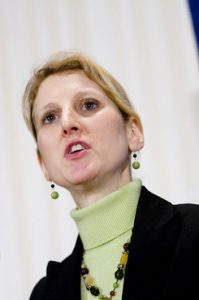 Caroline Fredrickson, executive director of the American Constitution Society for Law and Policy. Photo: Diego M. Radzinschi/ALM
Caroline Fredrickson, executive director of the American Constitution Society for Law and Policy. Photo: Diego M. Radzinschi/ALM"Lots of people in the ACS network would make great judges. And part of what ACS wants to do is to help progressive lawyers across the country who think that they want to be judges understand what you need to do to get to be a judge," Karlan said. "But I don't view ACS as simply an employment agency."
How best to counter the Federalist Society's influence is now a topic of conversation among liberal activists addressing the federal judiciary. The group has been instrumental in helping Trump confirm more than 150 Article III judges to the bench, at a breakneck pace and far surpassing former President Barack Obama at this point in his first term.
But leaders among the left-leaning groups don't necessarily want to adopt the conservative model of having one group lead the charge.
Rather, they want more progressive voters to care about the courts, and make more people aware of the influence the judiciary can have immediately and down the line.
The Democratic presidential candidates have been largely quiet on the kinds of judges, or even justices, they would tap for the bench. Court reforms, including expanding the Supreme Court, have been backed by several candidates and eschewed by others.
However, even as the candidates have said little on the kinds of judges they would nominate, the judicial groups are gearing up to chip in if an administration comes knocking.
Nan Aron, the president of the liberal group Alliance for Justice, said her group has "very ambitious plans for the future" on helping out with judicial nominees.
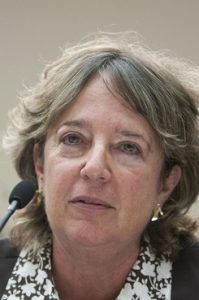 Nan Aron, president of Alliance for Justice. Photo: Diego M. Radzinschi/ALM.
Nan Aron, president of Alliance for Justice. Photo: Diego M. Radzinschi/ALM.Some of those plans include creating an agenda on judicial nominees for the next administration and recommendations on how nominees should be selected.
"It's critically important for the next administration to prioritize filling vacancies on the federal bench, particularly given the harmful effects across society as a result of the Trump judges,"
Aron said. "AFJ is not waiting for the next administration, however, to organize. We are beginning now to put in place in theory the programs and agenda so that the Senate, the new president can hit the ground running and prioritizing federal judges across the country."
The progressive group Demand Justice isn't waiting either. It's already released a shortlist of potential Supreme Court nominees—none from Big Law—who are generally armed with progressive credentials.
Brian Fallon, the executive director of Demand Justice, said the group doesn't necessarily expect a candidate to sign onto that short list. Rather, he said, the objective was to get Democratic candidates thinking and talking about the kinds of people they would appoint.
He pointed to Sen. Bernie Sanders, who proposed ideas during the 2016 presidential election that were considered radical, like eliminating student debt, that have since become more mainstream.
"We want to shift the paradigm for the kinds of players being considered for those judicial vacancies," Fallon said.
This content has been archived. It is available through our partners, LexisNexis® and Bloomberg Law.
To view this content, please continue to their sites.
Not a Lexis Subscriber?
Subscribe Now
Not a Bloomberg Law Subscriber?
Subscribe Now
NOT FOR REPRINT
© 2025 ALM Global, LLC, All Rights Reserved. Request academic re-use from www.copyright.com. All other uses, submit a request to [email protected]. For more information visit Asset & Logo Licensing.
You Might Like
View All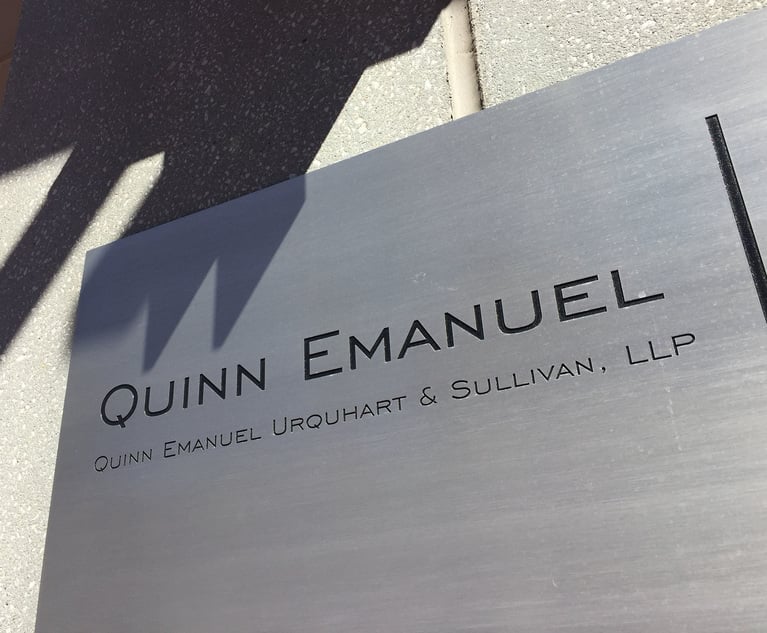
Quinn Emanuel Files Countersuit Against DOJ in Row Over Premerger Reporting
3 minute read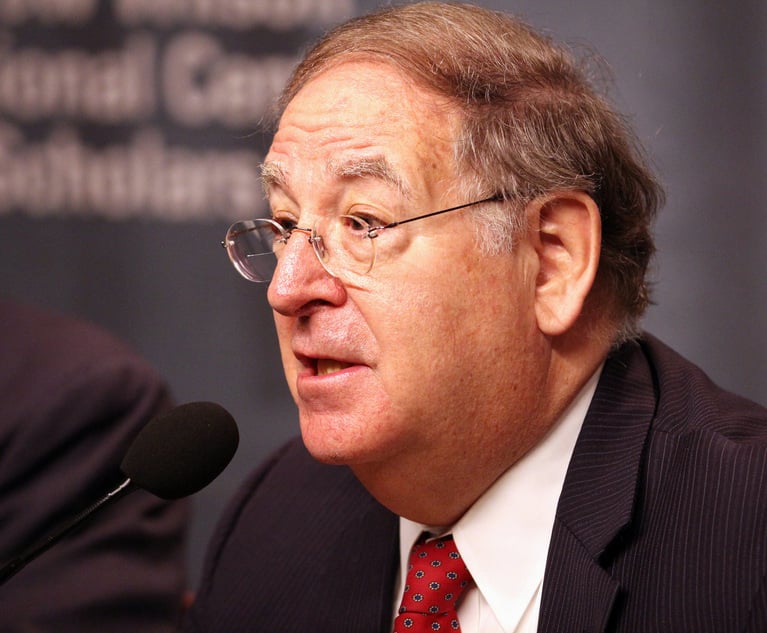
'Thoughtful Jurist': Maryland US District Senior Judge Messitte Dies After Short Illness
4 minute read
'Religious Discrimination'?: 4th Circuit Revives Challenge to Employer Vaccine Mandate
2 minute read
4th Circuit Revives Racial Harassment Lawsuit Against North Carolina School District
3 minute readTrending Stories
Who Got The Work
J. Brugh Lower of Gibbons has entered an appearance for industrial equipment supplier Devco Corporation in a pending trademark infringement lawsuit. The suit, accusing the defendant of selling knock-off Graco products, was filed Dec. 18 in New Jersey District Court by Rivkin Radler on behalf of Graco Inc. and Graco Minnesota. The case, assigned to U.S. District Judge Zahid N. Quraishi, is 3:24-cv-11294, Graco Inc. et al v. Devco Corporation.
Who Got The Work
Rebecca Maller-Stein and Kent A. Yalowitz of Arnold & Porter Kaye Scholer have entered their appearances for Hanaco Venture Capital and its executives, Lior Prosor and David Frankel, in a pending securities lawsuit. The action, filed on Dec. 24 in New York Southern District Court by Zell, Aron & Co. on behalf of Goldeneye Advisors, accuses the defendants of negligently and fraudulently managing the plaintiff's $1 million investment. The case, assigned to U.S. District Judge Vernon S. Broderick, is 1:24-cv-09918, Goldeneye Advisors, LLC v. Hanaco Venture Capital, Ltd. et al.
Who Got The Work
Attorneys from A&O Shearman has stepped in as defense counsel for Toronto-Dominion Bank and other defendants in a pending securities class action. The suit, filed Dec. 11 in New York Southern District Court by Bleichmar Fonti & Auld, accuses the defendants of concealing the bank's 'pervasive' deficiencies in regards to its compliance with the Bank Secrecy Act and the quality of its anti-money laundering controls. The case, assigned to U.S. District Judge Arun Subramanian, is 1:24-cv-09445, Gonzalez v. The Toronto-Dominion Bank et al.
Who Got The Work
Crown Castle International, a Pennsylvania company providing shared communications infrastructure, has turned to Luke D. Wolf of Gordon Rees Scully Mansukhani to fend off a pending breach-of-contract lawsuit. The court action, filed Nov. 25 in Michigan Eastern District Court by Hooper Hathaway PC on behalf of The Town Residences LLC, accuses Crown Castle of failing to transfer approximately $30,000 in utility payments from T-Mobile in breach of a roof-top lease and assignment agreement. The case, assigned to U.S. District Judge Susan K. Declercq, is 2:24-cv-13131, The Town Residences LLC v. T-Mobile US, Inc. et al.
Who Got The Work
Wilfred P. Coronato and Daniel M. Schwartz of McCarter & English have stepped in as defense counsel to Electrolux Home Products Inc. in a pending product liability lawsuit. The court action, filed Nov. 26 in New York Eastern District Court by Poulos Lopiccolo PC and Nagel Rice LLP on behalf of David Stern, alleges that the defendant's refrigerators’ drawers and shelving repeatedly break and fall apart within months after purchase. The case, assigned to U.S. District Judge Joan M. Azrack, is 2:24-cv-08204, Stern v. Electrolux Home Products, Inc.










